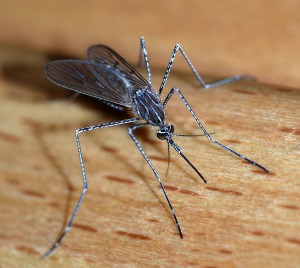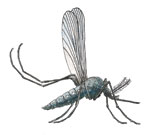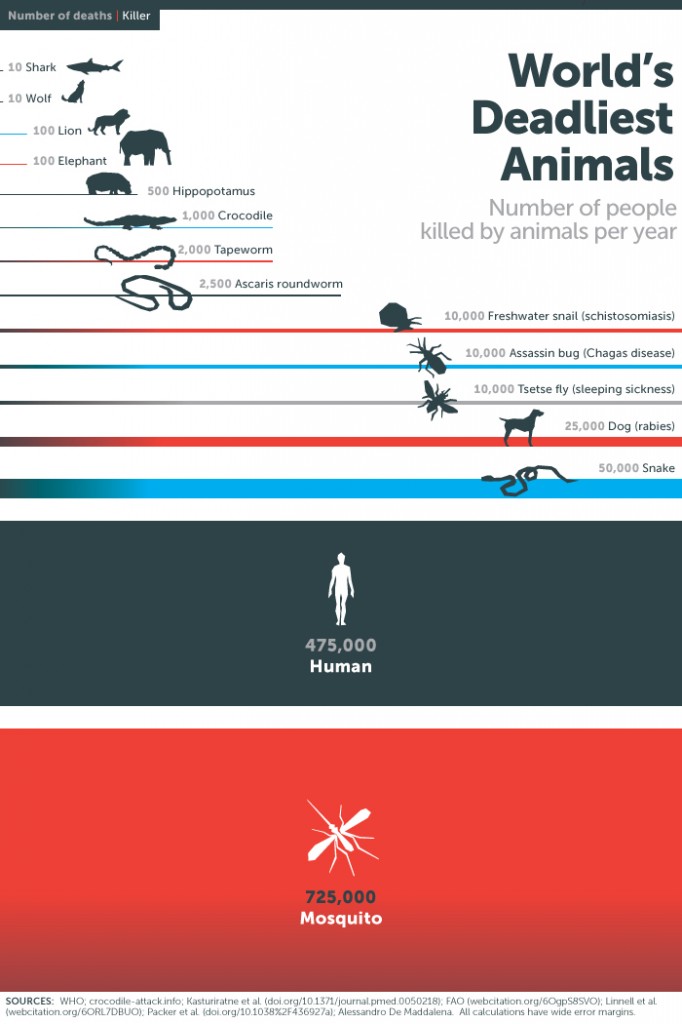
Apr 3, 2018 | Mosquito, Pest Control
The South is known for many things like warm weather, sweet tea, and southern hospitality. Unfortunately, the south is also known for another thing – mosquitoes! Mosquitoes thrive in warm, humid climates like we have here in the southern United States. As the weather warms, mosquito season begins and peaks in the mid-summer months. Mosquitoes can breed in less than 1 inch of water so the South offers them a multitude of habitats to expand their populations.
Mosquito bites cause irritation and itching of the skin. Besides this nuisance, mosquitoes can also transmit diseases that can threaten the health of both humans and animals. Here are some of the most common diseases that can be spread by mosquitoes:
MALARIA
- Spread by Anopheles species of mosquito
- About 1700 cases per year in the US
- Most cases are from travelers returning from malaria infected countries
- Serious disease, sometimes fatal
- Symptoms include high fevers, chills, sweats, headache, body aches, nausea and vomiting
- Curable if diagnosed and treated promptly
- The potential for the disease to re-emerge in the US is present especially in the South
DENGUE
- Spread by the Aedes aegypti mosquito
- Rarely occurs in the US but rampant in Puerto Rico and Latin America
- Symptoms include high fever, severe headache, pain behind the eyes, joint pain, muscle and bone pain, rash, and mild bleeding (especially of the nose and gums)
- No vaccine to prevent in the US but there are vaccines registered for use in other countries
- No specific treatment; treat symptomatically with pain relievers, fever reducers, rest, and fluids
CHIKUNGUNYA
- Spread by the Aedes species of mosquito (Aedes aegypti and Aedes albopictus)
- Very similar to dengue and Zika
- Symptoms include fever, joint pain, headache, muscle pain, joint swelling, and rash
- Rarely fatal but extremely debilitating
- No vaccine to prevent
- Treatment is symptomatic with rest, fluids, fever reducers, and pain relievers
WEST NILE VIRUS
- West Nile Virus has been detected in over 30 species of mosquitoes
- Cases have been reported in all of the continental US
- Most people (8/10) do not have any symptoms at all
- 1/5 people have a high fever
- 1/150 people develop encephalitis which can be fatal
- No vaccine to prevent
- Treatment is symptomatic with fever reducers and pain relievers
ZIKA
- Spread by the Aedes species of mosquito
- Also spread by sexual contact and from pregnant mothers to their fetus
- Cases have been reported in all of the continental United States
- Symptoms include fever, rash, headache, joint pain, red eyes, and muscle pain
- Zika can also cause birth defects when passed to babies from their mothers during pregnancy
- No vaccine to prevent
- Treatment is symptomatic with rest, fluids, pain relievers, and fever reducers
PREVENTION:
Now that you know some of the diseases you can contract from mosquitoes what can you do to prevent them? Avoiding mosquito bites is the #1 way to prevent all of the diseases mentioned above. Check out these tips to avoid mosquito bites and help keep them away from yourself and your home.
- Eliminate standing water around your home, especially in old tires, buckets, plastic covers, toys, and any other containers that can hold water.
- Empty and change the water in bird baths, fountains, wading pools, and rain barrels at least once a week.
- Empty and change water in outdoor pet bowls daily.
- Check gutters for clogs which can cause water to pool. Clean them regularly, especially during the summer season. Consider installing gutter guards to help prevent clogs.
- Drain and fill any temporary pools of water around your home with dirt. Try to get your yard as level as possible.
- Keep swimming pool water treated appropriately and circulating.
- Make sure window and door screens are in good repair. Cover any gaps in walls, doors, and windows to keep mosquitoes from getting into your home.
- Keep doors and windows closed and stay indoors as much as possible, especially during the summer months.
- Keep your grass cut short and rake up any fallen leaves. Mosquitoes like to rest on grass during the day so keeping it short will eliminate this. Leaves can hold enough water for mosquitoes to breed so keep them raked up, as well.
- Replace your outdoor lights with yellow “bug lights.” These don’t eliminate mosquitoes but they do attract less of them than regular lights do.
- If you have to go outside, wear long sleeved shirts, long pants, and socks. Tuck your shirt into your pants and your pants into your socks to protect as much skin as possible.
- If you have to be outside in areas where there are a large number of mosquitoes, use head nets, long sleeves, and long pants.
- Use EPA-registered mosquito repellents but be sure to follow precautions and instructions carefully.
- Avoid using scented bath products if possible. While the connection is unknown, studies have shown that mosquitoes seem to be attracted to fragrances found in shampoo, perfume, cologne, and lotion.
May 19, 2014 | Mosquito
Are Mosquitoes the Most Deadly Animal? The Dangers of Mosquitoes.
Bill Gates recently wrote “The Deadliest Animal in the World” on his blog, ‘gatesnotes’. In this article, Mr. Gates quotes some pretty startling statistics about the dangers of mosquitoes and their threat to humans. Mosquitoes kill more people each year than any other animal in the world. How’s that for the tiny, annoying bug that we often sarcastically refer to as the “state bird”?!
There are over 2,500 species of mosquitoes around the world (covering every region except Antarctica). Besides termites and ants, mosquitoes outnumber every other animal.
What makes mosquitoes so dangerous?
Mosquitoes can carry malaria, dengue fever, yellow fever, West Nile, and encephalitis. Malaria alone threatens half of the world’s population and is responsible for killing more than 600,000 people each year. Dengue fever causes serious illness and death, especially among children. Cases of dengue fever were discovered in Florida last year. Read more on Bill Gates recent trip to Indonesia to learn more about the fight against dengue fever HERE.
We encourage you to read Bill Gates full blog on the dangers of mosquitoes. For more information on what you can do to control mosquitoes around your home visit https://www.callnorthwest.com/pest-control/mosquito-control/
Jul 1, 2013 | Uncategorized
It’s a bird! It’s a plane! It’s a…MOSQUITO?!?!

Source
Yes, that is right mosquito season is here! And although we all enjoyed the mild winter, we may not be able to say the same this summer. Mild winters usually mean an influx in pest pressure for Pest Management Professionals and their customers…including mosquitoes.
There are currently 63 different species of mosquitoes found in GA. Approximately$125,000,000 is spent annually in Georgia in an effort to reduce and treat the effects of disease and nuisance caused by mosquitoes. That’s a lot of money to control one insect. But is there a cost to protect the public’s health? Because the mosquito has become a big threat!
Worldwide malaria remains the most important human disease transmitted by mosquitoes. Malaria counts for almost 2 million deaths each year and is estimated that there are over 400 million cases in the world. In Georgia, we see about 50 to 60 cases of Malaria a year. Although Malaria affects the most humans worldwide there are two other diseases that we see more frequently in Georgia.
The West Nile virus was first found in the states in 1999. In 2002, the virus spread over most of the United States and caused over 4,000 cases and 277 deaths. The virus is transmitted from the mosquito to a host bird, where the virus grows and then is transmitted to an incidental host (humans) by another mosquito. To date, there is no antivirus for those affected with the disease.
Another common disease doesn’t affect humans directly but it does affect the family dog. Dog heartworms are a serious problem and are spread by mosquitoes. Infection rates in some states have been reported to be as high as 80% in dogs over 2.5 years old, and almost 100% in dogs over 5 years old that are left un-vaccinated. There is approximately $60,000,000 being spent on heartworm prevention in Georgia each year and it cost nearly $1,000 to treat a case of heartworms. Bottom-line…make sure you treat your dog for heartworms BEFORE it’s an issue.
So what can we do? Mosquito prevention at Northwest Exterminating is a five step program following the basic principles of an Integrated Mosquito Management program:
- Education
- Surveillance
- Source Reduction
- Larviciding
- Adulticiding
It is important as homeowner’s that we do our part. Here are some simple steps to help reduce mosquitoes around your home:
- Reduce water collection sites
- Clean gutters regularly
- Remove yard clutter
For more tips like these and to help reduce the amount of mosquitoes around your home call Northwest Exterminating. Our goal is to create a healthier environment around your home so you can enjoy your yard!
Adam Vannest
Director of Pest Services
Northwest Exterminating
[email protected]
Jul 1, 2013 | Uncategorized
It’s a bird! It’s a plane! It’s a…MOSQUITO?!?!

Source
Yes, that is right mosquito season is here! And although we all enjoyed the mild winter, we may not be able to say the same this summer. Mild winters usually mean an influx in pest pressure for Pest Management Professionals and their customers…including mosquitoes.
There are currently 63 different species of mosquitoes found in GA. Approximately$125,000,000 is spent annually in Georgia in an effort to reduce and treat the effects of disease and nuisance caused by mosquitoes. That’s a lot of money to control one insect. But is there a cost to protect the public’s health? Because the mosquito has become a big threat!
Worldwide malaria remains the most important human disease transmitted by mosquitoes. Malaria counts for almost 2 million deaths each year and is estimated that there are over 400 million cases in the world. In Georgia, we see about 50 to 60 cases of Malaria a year. Although Malaria affects the most humans worldwide there are two other diseases that we see more frequently in Georgia.
The West Nile virus was first found in the states in 1999. In 2002, the virus spread over most of the United States and caused over 4,000 cases and 277 deaths. The virus is transmitted from the mosquito to a host bird, where the virus grows and then is transmitted to an incidental host (humans) by another mosquito. To date, there is no antivirus for those affected with the disease.
Another common disease doesn’t affect humans directly but it does affect the family dog. Dog heartworms are a serious problem and are spread by mosquitoes. Infection rates in some states have been reported to be as high as 80% in dogs over 2.5 years old, and almost 100% in dogs over 5 years old that are left un-vaccinated. There is approximately $60,000,000 being spent on heartworm prevention in Georgia each year and it cost nearly $1,000 to treat a case of heartworms. Bottom-line…make sure you treat your dog for heartworms BEFORE it’s an issue.
So what can we do? Mosquito prevention at Northwest Exterminating is a five step program following the basic principles of an Integrated Mosquito Management program:
- Education
- Surveillance
- Source Reduction
- Larviciding
- Adulticiding
It is important as homeowner’s that we do our part. Here are some simple steps to help reduce mosquitoes around your home:
- Reduce water collection sites
- Clean gutters regularly
- Remove yard clutter
For more tips like these and to help reduce the amount of mosquitoes around your home call Northwest Exterminating. Our goal is to create a healthier environment around your home so you can enjoy your yard!
Adam Vannest
Director of Pest Services
Northwest Exterminating
[email protected]
May 17, 2013 | Uncategorized
 Take Back Your Yard!Don’t let mosquitoes suck the fun out of your Summer!
Take Back Your Yard!Don’t let mosquitoes suck the fun out of your Summer!
HABITS
- Breed in stagnant water such as ponds, marshes, drainage ditches, etc.
- Can be found in almost every type of landscape on Earth except deserts and the Arctic.
- Bite most often at dusk and dawn.
THREATS
OTHER PESTS TO LOOK OUT FOR:
PREVENTION
- Eliminate areas of standing water around the home such as flower pots, bird baths, etc. Mosquitoes only need about one half inch of water to breed.
- Avoid outdoor activities between dusk and dawn.
- Wear long pants and sleeves when outdoors whenever possible.
- Use an insect repellant that contains DEET.
- Call Northwest Exterminating for a professional inspection and treatment plan for breeding sites.
Enjoy your yard this Spring and Summer. Call Northwest Exterminating for more information on our Green Mosquito Program!


 Take Back Your Yard!Don’t let mosquitoes suck the fun out of your Summer!
Take Back Your Yard!Don’t let mosquitoes suck the fun out of your Summer!